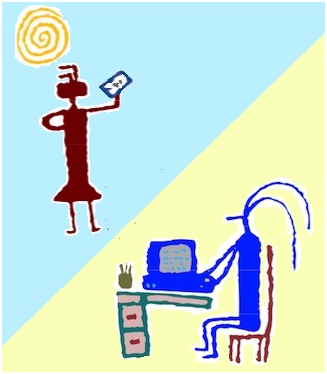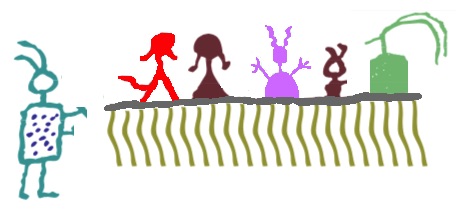
I see lots of young people online who are wondering how to build up their skills and résumés in this time of COVID-19, or to explore careers with so many onsite experiences closed to them. I want to remind them all (they all read my blog, right?) that volunteering to help with an online community is a great way to get experience, to build your skills, to build your knowledge, to build your portfolio and to network for jobs.
Don’t believe me? I’ve been helping with online communities since 1993 or so, mostly as a volunteer. And those experiences have played a substantial part in both getting professional positions and getting experience that’s helped me in my offline work.
The first online community I participated in was the soc.org.nonprofit USENET newsgroup. It was created in June 1994 and gatewayed to the email-based mailing list USNONPROFIT-L. The community was for the discussion of nonprofit management and program issues. I found it soon after it was created and, after a couple of years of participating, because I was such a prolific contributor, I got asked to co-moderate it, as a volunteer, and I did so for several years. My participation there, and some onsite volunteering and collaboration, lead me to being offered a paid position: to direct the Virtual Volunteering Project.
In the late 1990s, I participated in three other online communities, all on YahooGroups: CyberVPM, UKVPMs, and OZVPM, all focused on managers of volunteers. It was because of my participation in those three communities, talking about the VV Project and virtual volunteering in general, that I got noticed by a United Nations agency in charge of the online volunteering portion of NetAid, and ended up directing what became the UN’s Online Volunteering Service. I also have lifelong colleagues and friends because of my volunteer participation in those three communities specifically.
In 2001 or so, while living in Germany and working for the UN Volunteers program, I started participating in the then newly-launched TechSoup online community. You can see an early version of that community on the Internet Wayback machine. I was a very active volunteer contributor and ended up getting asked to be a volunteer moderator, helping to introduce topics, answer questions and delete spam, and to lead a couple of online events. And years later, in 2009, after volunteering on and off, I got a part-time contracting gig helping with the community and some online events. I’ve done that off and on ever since (including now!).
Around that same time, someone set up an online community for people working in international aid and development work. I joined that community and, once again, I was a prolific contributor, as a volunteer, and eventually got asked to be a volunteer board member of the newly-formed nonprofit that got set up to support the community. The Aid Workers Network lasted for just a few years, but I got asked about that experience regularly in job interviews, and there are two people that remain my professional colleagues to this day.
On Reddit, I’ve been the volunteer moderator for the volunteer community, the community service subreddit, and the inclusion subreddit, for a few years now – and I got a short, well-paid consulting gig earlier this year because of my activities on the volunteer subreddit specifically.
So, that’s my story on how volunteering to contribute, moderate, facilitate and lead online communities has helped me professionally. It could help you, too:
- Look for Reddit communities that represent what you want to do professionally or as a volunteer. Read a lot before you contribute, and always read as much as you yourself post. When you feel ready, post helpful, on-topic questions, advice and comments. Follow the rules. If you do this regularly, don’t be surprised if you end up getting asked to be a moderator. Even if you aren’t asked to be a moderator, if you think your contributions show your expertise, workstyle and character, consider including a link to your Reddit profile on your résumé.
- If you use computers or your smart phone as a part of your volunteering or professional work with nonprofits, NGOs, charities, community groups, advocacy groups, libraries, religious groups, etc., and you want to share your experience and help others that might be trying to do so, consider joining the TechSoup online community and contributing to the subjects there, like Databases and Software (including apps), Web Building, Digital Engagement, Hardware, Servers & Networks, Security, Privacy & Safety, Tech in Disasters, Tech Planning and Policies or Tech4Good, Tech Making a Difference, Tech in Society.
- Use Google, Bing or Duck Duck Go, and on Facebook, to find online communities hosted on other platforms that relate to what you want to do, whether its humanitarian work, nonprofit theater management, rescuing wildlife, logistics after disasters, whatever. As always, read a lot before you contribute, and always read as much as you post. Post helpful, on-topic questions, advice and comments and follow the rules. You might get asked to be a moderator, but regardless, you’ll create an online profile potential employers might find quite interesting.
And if your nonprofit, NGO, charity, library, etc. has an online community, the contributors to that community are volunteers, even if you don’t call them such, even if you also call them clients or community members instead. If they are asking questions, offering comments and advice, introducing discussions on your community, even debating (but are staying on topic) and you aren’t paying them, they are online volunteers, they are contributing their time and talents, and you are engaged in virtual volunteering.

For detailed advice on creating assignments for online volunteers, for working with online volunteers, for using the Internet to support and involve ALL volunteers (including those providing service onsite), and for ensuring success in virtual volunteering, check out The Last Virtual Volunteering Guidebook. You will not find a more detailed guide anywhere for working with online volunteers and using the Internet to support and involve all volunteers. It’s available both as a traditional paperback and as an online book. It’s co-written by myself and Susan Ellis. If your organization wants to better engage the people who contribute to your online communities – and, yes, those are online volunteers – this book can help.
Also see:
- Factors for Success for a Neighborhood or Town-Based Online Community.
- Lessons on effective, valuable online communities – from the 1990s.
- Online leadership/Influencing Online.
- Evaluating Online Activities: Online Action Should Create & Support Offline Action.
- How to handle online criticism of your organization.
- Judgment & reputation online – and off.
- Virtue & reputation in the developing world.
- How to be active & anonymous online – a guide for women in religiously-conservative countries.

If you have benefited from this blog or other parts of my web site and would like to support the time that went into researching information, developing material, preparing articles, updating pages, etc. (I receive no funding for this work), here is how you can help.

